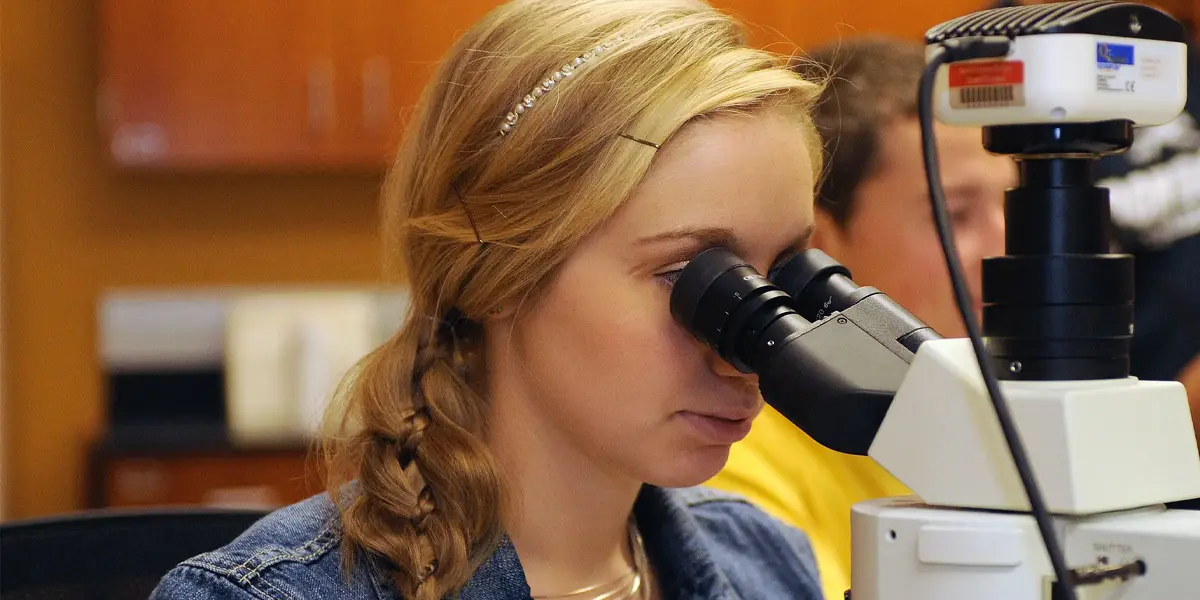Biotechnology
- Minor
- Certification

-
In This Section
Biotechnology describes the manipulation of a living system, at any level, for the purpose of creating a useful product or process.
Over the past twenty years, the emerging field of biotechnology has fundamentally changed the world we live in. It has led to breakthrough medical discoveries, greater understanding of the building blocks of life, advances in evolutionary biology, environmental remediation, agriculture, industrial processes, biomaterials and even artificial intelligence. It has also spawned intense controversy. Public policy debates, ethical and religious concerns, legal and financial scandals and questions of research integrity have all been a part of the biotechnology revolution.
Applicants to the program have the opportunity to apply for a four year, $5000 annual STEP Scholarship. The Science, Technology, Engineering and Mathematics Talent Expansion Program or STEP, is a national initiative that encourages global competitiveness in the sciences. Students will also have the opportunity to participate in the Collaborative Learning Program, a peer-led learning program.
Apply now for four year, $5000 STEP scholarships!
Undergraduate Programs
Undergraduate Admission
Phone:
800-782-5549
Ext. 2500
Email:
admission@stvincent.edu
Curriculum Requirements
-
Requirements for a Minor in Biotechnology
Minor in Biotechnology
To be completed concurrently with a traditional major course of study.Minor Requirements (21 Credits)
BL 214 Molecular Genetics* - 3 credits
BL 215 Molecular Genetics Laboratory - 1 credit
BL 216 Biotechnology* - 3 credits
BL 217 Biotechnology Laboratory - 1 credit
BIN 218 Bioinformatics I - 3 credits
PS 218 Policy and Business of Technology - 3 credits
PL 218 Bioethics 3 or RS 282 Christian Bioethics - 3 credits
3 credits selected from:
BA 104 Introduction to Management - 3 credits
BA 230 Introduction to Entrepreneurship - 3 credits
PS 150 Government and Business - 3 credits
Internship/Research Experience/Cumulative Paper - 1 credit*These courses require the General Biology series (BL 151-154) as a prerequisite. The minor in Biotechnology requires, in addition to coursework, an applied internship, research experience or cumulative paper.
-
Certification Prerequisites
BL 150 General Biology I - 3 credits
BL 152 General Biology II - 3 credits
BL 151 General Biology Laboratory I - 1 credit
BL 153 General Biology Laboratory II - 1 credit
CH 101 General Chemistry I - 3 credits
CH 102 General Chemistry II - 3 credits
CH 103 General Chemistry Laboratory I - 1 credit
CH 104 General Chemistry Laboratory II - 1 credit
CH 221 Organic Chemistry I - 3 credits
CH 222 Organic Chemistry II - 3 credits
CH 223 Organic Chemistry Laboratory I - 1 credit
CH 224 Organic Chemistry Laboratory II - 1 credit
BL 214 Molecular Genetics - 3 credits
BL 215 Molecular Genetics Laboratory - 1 credit
BL 208 Cell Biology - 3 credits
BL 209 Cell Biology Laboratory - 1 credit
MA 109 Calculus I - 4 credits -
Requirements for a Certification in Biotechnology
This certification may be acquired as a Post-Baccalaureate Certificate (usually in one year), or concurrently with a traditional major course of study (may require an additional semester to complete).
Certification Requirements (32 credits):
BL 216 Biotechnology - 3 credits
BL 217 Biotechnology Laboratory - 1 credit
BIN 218 Bioinformatics I - 3 credits
BL 260 Biostatistics - 3 credits
CH 251 Proteins & Metabolism - 3 credits
CH 253 Proteins & Metabolism Laboratory - 1 credit
CH 252 Nucleic Acids - 3 credits
CH 254 Nucleic Acids Laboratory - 1 credit
PS 218 Policy and Business of Technology - 3 credits
PL 218 Bioethics 3 or RS 282 Christian Bioethics - 3 credits
4 credits (course & laboratory) selected from:
BL 220 Comparative Vertebrate Anatomy - 3 credits
BL 221 Comparative Vertebrate Anatomy Laboratory - 1 credit
BL 222 Developmental Biology - 3 credits
BL 223 Developmental Biology Laboratory - 1 credit
BL 224 Mammalian Physiology - 3 credits
BL 225 Mammalian Physiology Laboratory - 1 credit
3 credits selected from:
BA 104 Introduction to Management - 3 credits
BA 220 Principles of Marketing - 3 credits
BA 230 Introduction to Entrepreneurship - 3 credits
Internship/Research Experience & Portfolio Completion - 1 creditThe Certification in Biotechnology requires, in addition to coursework, an applied internship or research experience, either paid or unpaid (which can occur on or off campus, during the summer or during the school year), and the completion of an individualized Portfolio. The Portfolio will be used to highlight a student’s acquired and demonstrated skills in biotechnology laboratory techniques, as well as their broader understanding of the field from a regulatory, policy, business, ethical, legal and societal perspective. It will also convey a student’s communicative and presentation abilities. At least 12 credits of the Certificate course requirements must be completed at Saint Vincent College.
Program Highlights
Student Learning Outcomes
At the core of a biotechnology curriculum is a strong foundation in biology, chemistry, mathematics, computer science and laboratory expertise. It is the interconnection of these fields that creates opportunity. The Herbert W. Boyer School of Natural Sciences, Mathematics and Computing is able to deliver an interdisciplinary curriculum while maintaining the intimacy of a small liberal arts college, allowing students to explore various interconnected subspecialties through one-on-one research experiences with faculty and industry.
Biotechnology, however, is more than just a discipline of science. It touches ethics, public policy, government, economics, business, education and law. Saint Vincent College has a distinct advantage in educating and preparing students for careers in biotechnology that extend beyond the laboratory. With strong existing programs in these liberal arts areas, we are in a position to address the whole discipline of biotechnology.
Undergraduate Programs
Undergraduate Admission
Phone:
800-782-5549
Ext. 2500
Email:
admission@stvincent.edu
